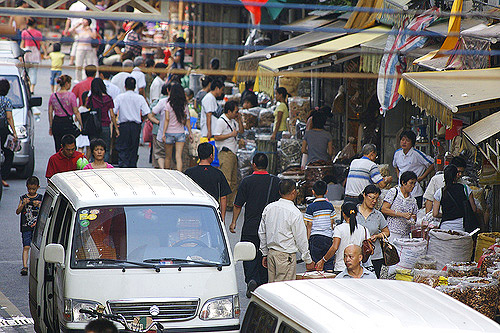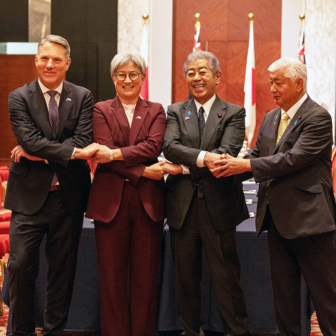WHEN fifty-seven-year-old Chen Xianmei saw a small child lying bleeding at the side of the road in a covered market in southern China’s Guangdong province, she did what anyone might have done: she tried to move the girl, who had been hit by two successive vehicles, out of the path of oncoming traffic, and raised the alarm. In fact, she did much more than most other passers-by did on that October day: Ms Chen, a migrant worker who collects waste for recycling after her morning shift in a restaurant, was the nineteenth person to walk past the injured child. The other eighteen, like the drivers of the vans that had hit her, did not stop.
It was a shocking case, and when closed-circuit television images of the events were shown on television and spread via the internet, it caused outrage across China and around the world. Some of those who passed by said they simply hadn’t noticed the little girl. But coming soon after an incident in which an eighty-eight-year-old man collapsed on the street in the city of Wuhan and was ignored by passers-by for two hours – resulting in his apparently avoidable death from a blocked respiratory tract – the case of two-year-old Yue Yue, who later died from her injuries, was seen as an indictment of the failure of many people in China to be “good Samaritans.” Chinese commentators spoke of a moral crisis in the country, warning that a growing obsession with materialism had created a nation of selfish people and caused a loss of basic human values. Wang Yang, Guangdong’s Communist Party chief, called on citizens to take a long hard look at what he described as the “ugliness” in their souls.
Yet what is perhaps equally shocking is that, as many in China quickly pointed out, a number of factors make people’s unwillingness to be good Samaritans almost understandable. China’s incomplete system of social medical insurance is one: since the dismantling of the socialist cradle-to-grave welfare system in the 1990s, urban citizens who contribute to city-run medical insurance funds often still have to pay a deposit upfront before a hospital will accept them for treatment. Meanwhile, despite some recent reforms, the majority of China’s hundred million–plus rural migrant workers are still not entitled to free healthcare in the cities where they work. As a result, kind-hearted people who have taken injured or sick people to hospital have found themselves asked to cover the costs of the victim’s treatment, if that person is too incapacitated – or simply too poor – to produce the cash themselves.
In a number of high-profile cases good Samaritans have been accused of causing the injuries of the people they have tried to help – either because the people were confused, or because they wanted to get compensation or have their medical bills paid. In several recent cases, people have been detained or even jailed after stopping to help others: according to a China Daily columnist, one man was held liable after the court ruled that “only the person who had injured the victim would behave in such a way.” Such an attitude may seem “tragic, pitiful and absurd,” he wrote, but it reflects “the common sense of our society today.” Indeed, so serious has the situation become that a professor of public administration in Guangdong recently set up a fund to provide financial aid to help defend people who are sued by those they try to help. China’s health ministry, meanwhile, has issued guidelines for the public on how to aid the sick and injured, suggesting citizens should first “try to determine the cause of the accident and plan a way to respond rather than rushing in to help” – an approach which, as many Chinese internet users noted, may not be the best way to save a life...
Add to this a growing fear of scams, in which people feign injury to dupe or rob those who stop to help, and it perhaps becomes easier to understand why people do not offer assistance – though in the case of an injured child their failure to do so still seems startling. What is harder to understand, however, is the fact that Chen Xianmei, the woman who stopped to help Yue Yue, soon found herself accused online of only doing so in order to gain publicity. Yue Yue’s mother, a stall-holder in the market where the tragedy occurred, was forced to take to the Chinese media to defend Chen’s sincerity. To me, this breathtaking cynicism is the most shocking aspect of the entire case, and in itself an indication of a serious breakdown in social values.
There’s no doubt that cynicism – not trusting that the medical system will offer treatment before counting the cost, for instance, or that the law will be fair to those who try to help – is now a major factor in Chinese society. There are plenty of good people in China: after Yue Yue’s accident, her parents received many donations from the public to cover her medical costs, and since her death the Chinese media have reported a number of examples of everyday altruism, perhaps with the aim of inspiring and encouraging disillusioned citizens. But even here cynicism is never far away: one such report, a film showing passers-by helping a pregnant woman who had fainted in a Shanghai park, aroused suspicion among internet users, and was eventually revealed to have been staged.
Commentators have argued that the roots of cynicism run deep in Chinese society. Public anger at repeated cases of official corruption is one reason: as the official China Daily commented, when reporting a new government campaign to give all civil servants training in ethics, “it seems the moral compass” in contemporary China “is not that clear.” And it added that unless the ethics and morality of those working for public service bodies improved fast, “the public will soon lose all trust and confidence in these agencies.” The paper also noted that one new campaign to instil ethics was targeted at four- to six-year-olds, and suggested that this was perhaps out of “disappointment” at the behaviour of adults. It criticised China’s “weak moral education” and said the country needed a debate on “what makes for a good citizen,” adding that, these days, “there is no moral glue that binds us together.”
Many people respond to this sense of crisis by suggesting that China should draw on traditional Confucian values, which emphasise people’s responsibilities to each other and to society. But others believe that the virulent denouncement of such values during the Cultural Revolution of the 1960s and 1970s may have shattered them for good. Indeed, one commentator at the China Daily argued, quite daringly, that the roots of today’s moral problems lie in the Cultural Revolution, and suggested that the official failure to call to account many of those guilty of crimes during that era has poisoned Chinese society ever since. The fact that much of the violence during the Cultural Revolution was carried out in the name of Chairman Mao means that the government has always regarded a full inquest as too sensitive.
Consequently, as commentator Zhu Yuan noted, “there have been very few published confessions or expressions of remorse over the evil things people did during that period.” This “ignoring of immorality” has instilled a sense that, as long as citizens believe “that they are doing what most people do” then they don’t worry whether it is right or wrong.
YET, if rebuilding civic values is a massive challenge, and if the legacy of the Cultural Revolution is unlikely to be tackled in the near future, there are surely other, simpler lessons to be learned from cases like Yue Yue’s. The little girl had wandered away from the market stall where her parents work – a reminder that for many migrant workers in China’s cities, there is no one to look after the children while the parents are busy. One Chinese academic noted recently that there have been many cases in which migrant children have “suffered burns, been injured in road accidents, electrocuted, or drowned” owing to lack of supervision. These children often find themselves playing on pavements or, if there are no pavements, in the streets or lanes where their parents work – and thus are at risk from China’s increasingly dangerous traffic.
The market where Yue Yue was knocked down, for example, has no separation between pedestrians and traffic in the alleys between its stalls. Enforcing such a separation could save lives, as, indeed, could creating more parks and safe places for children to play in (of which there’s a distinct shortage in many Chinese cities). Enforcing traffic regulations properly could also prevent injuries: there’s a sense in many Chinese cities that the authorities are not doing enough to protect pedestrians; indeed, in many cases they seem to have more or less given up on trying to stop motorcyclists jumping red lights, or preventing people from riding fast but silent electric bicycles on pavements. (In the city of Shenzhen – which has now decided to ban e-bikes from its city centre – electric bicycles were responsible for at least sixty-four deaths and over 200 injuries last year.)
In the race to develop China’s economy, though, how much do the authorities really care about safety? In Shanghai recently, one district government began putting up posters asking citizens to care about the lives and safety of children. Having not seen anything like this in public before, I found it encouraging. Then I walked down one of the city’s main streets and found that a gang of workers was dismantling an old roof which jutted out over a pavement along which many children and elderly people walk. No barrier had been erected to stop people walking into danger. The demolition continued for several weeks, with old pieces of wood and metal, and occasionally masonry too, being casually thrown onto the pavement below. I asked one of the workers why the pavement hadn’t been fenced off; he looked at me as if I were mad and said simply, “This is a government project,” as though it couldn’t be questioned.
If official projects pay little attention to safety, how can the government expect overworked delivery men and migrant workers on their motorbikes and electric bicycles to worry? If the authorities tackled such attitudes within their own ranks, it might be a practical and effective first step towards tackling the careless cynicism that many now fear has corroded Chinese society and public morality. •




